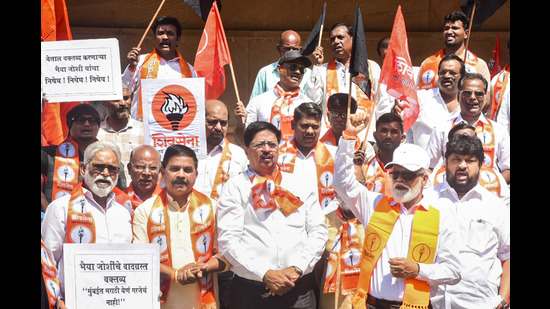Managing the language wars
The political class must negotiate the language fault line in Indian polity by recognising its fraught history and constitutional guardrails
The row over RSS ideologue Suresh “Bhaiyyaji” Joshi’s remarks on the place of Marathi in Mumbai puts the spotlight on the language debate that has roiled the nation since Independence. It also overlaps with many ongoing controversies such as the one over the three-language formula proposed in the New Education Policy and flags the question if a linguistic singularity can be imposed on the nation and the many metropolises that drive its economy.

It is not surprising that Joshi’s remarks — “Mumbai doesn’t have a single language” and that “if you are residing in Mumbai, it is not necessary that you have to learn Marathi” — have touched a raw nerve in Maharashtra, which was formed in 1960 following a four-year long agitation led by a rainbow political platform, the Maharashtra Sangharsh Samiti, that advocated the formation of a state of native Marathi speakers residing in the districts of western and central India. A key demand of the Samiti was that Mumbai, then Bombay, should be the capital of this new state: Some had argued that Bombay should be a part of Gujarat or stay independent of both Maharashtra and Gujarat. Joshi has since clarified that his remarks were misunderstood, but a point he reiterated even in his clarification — that Mumbai “is a great example of coexistence that people speaking so many different languages in India live together” — is pertinent. This state of coexistence Joshi talks about is not always a given, but one that is constantly negotiated by speakers of the dominant native language and non-native migrant residents. Competition for resources, especially jobs, often upsets the delicate balance of interests and short-sighted, populist politicians weaponise language to fuel resentment and polarise voters for narrow electoral gains. Most of India’s large metros — especially, Bengaluru, Chennai, and Gurugram besides Mumbai — have experienced such divisive politics in the form of street mobilisations, renaming of cities, and privileging of the local language over other tongues to legislative action for reserving jobs to native residents. The fact is urban conglomerations turn into great cities when they attract talent from everywhere and nurture a climate of coexistence of diverse faiths, ethnicities, and, of course, languages.
Language has always been a major fault line in our polity, which has also shaped the contours of Indian federalism. Borrowing the logic of the modern nation-State, which is built around a single language and faith, some have advocated a common national/official language for the country. Others have argued for treating all recognised languages as equals and against the imposition of any one language as official or national. This debate can be traced to the early days of the national movement — the 1920 Nagpur Congress Session passed a resolution in favour of provincial Congress committees based on the linguistic principle. Linguistic sub-nationalism emerged in different parts of India along with the rise of nationalist sentiment. The Nagpur resolution foresaw this development and recognised the need to forge a pact between the two. However, independent India, scarred by Partition, was ambiguous about linguistic states. The first States Reorganisation Committee (SRC) was set up after public protests and led to the reconfiguration of provinces in southern India in 1956. India’s Northeast also saw major language-centric political movements, the Assam agitation being the most notable and influential one.
This history needs to be kept in mind as the Centre engages with state governments that refuse to yield any inch on the language question. Aspiring for a mono-lingual existence is a fraught idea that militates against India’s political and constitutional history. A big political challenge of our time is to balance linguistic sub-nationalism with the unitarian demands of the nation-State. Both can co-exist in a truly federal system: The periodic, and perhaps inevitable, rise in tensions needs to be negotiated in a spirit of give and take and within the principles outlined in the Constitution.
All Access.
One Subscription.
Get 360° coverage—from daily headlines
to 100 year archives.



HT App & Website







